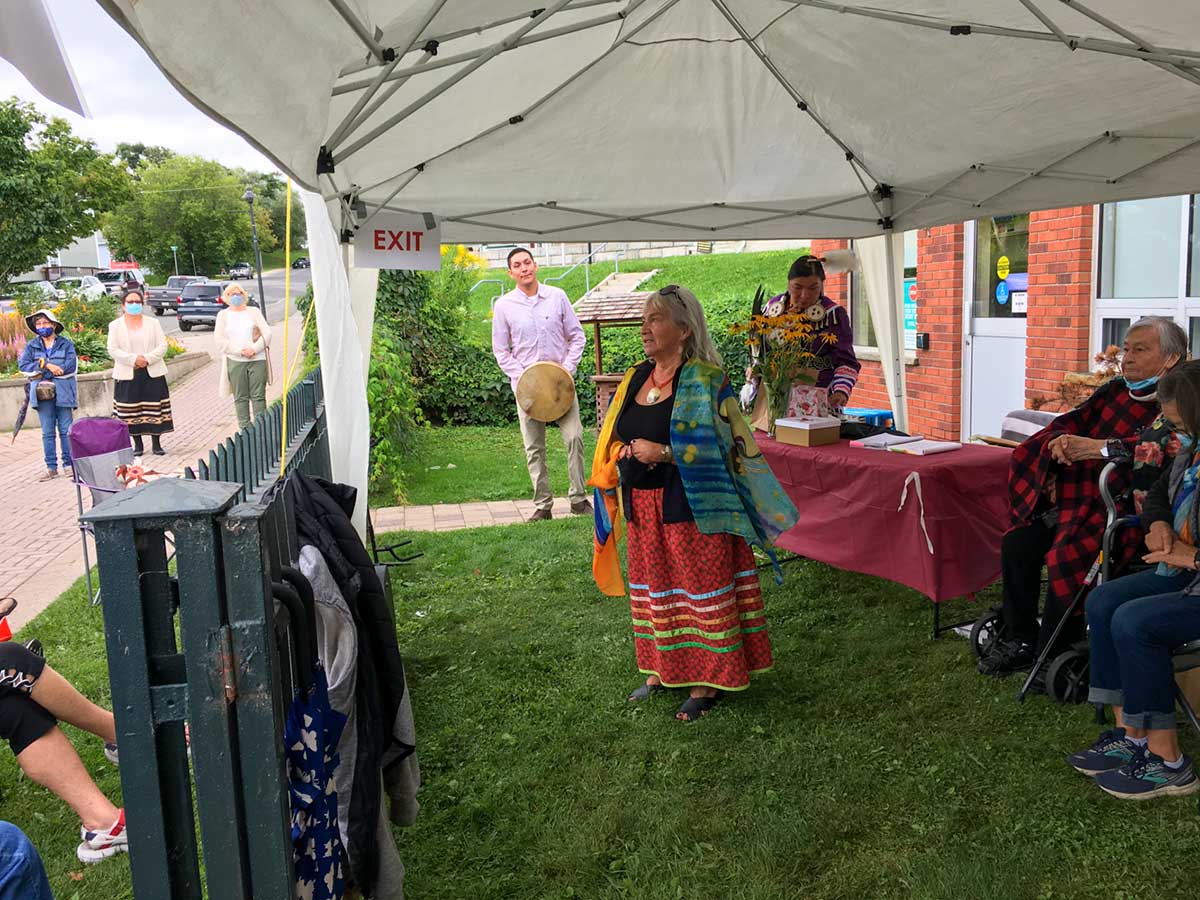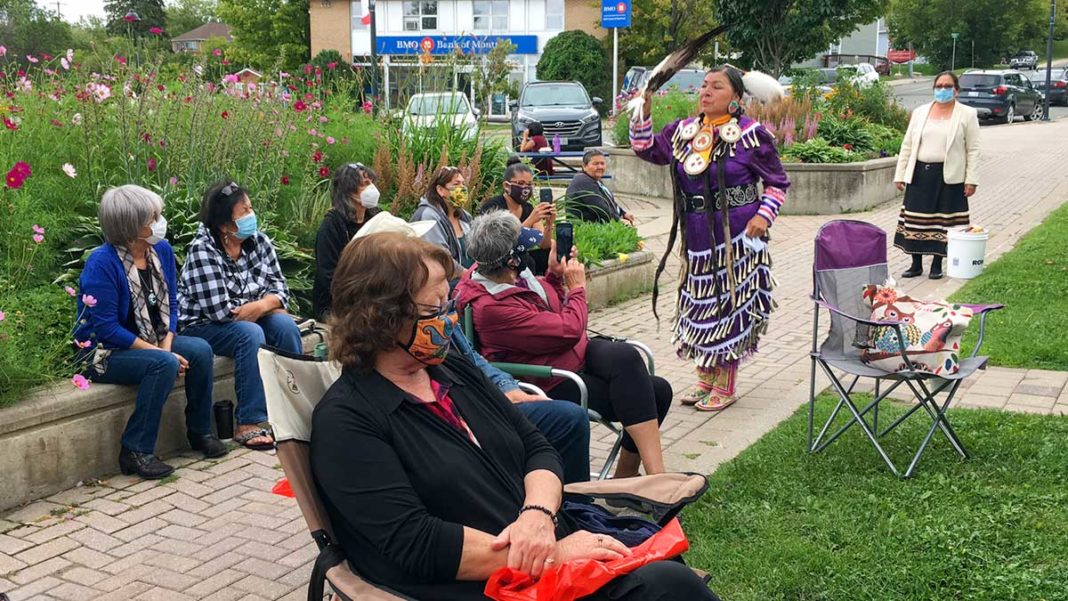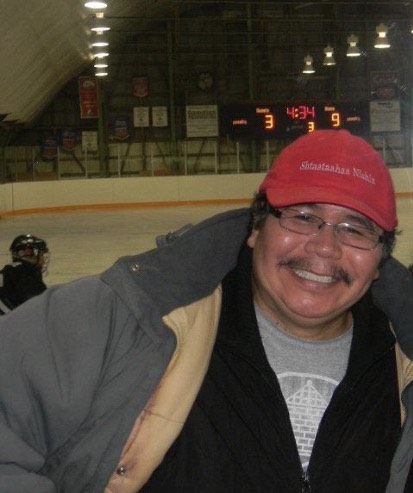LITTLE CURRENT – Karen Pheasant-Neganigwane’s beautifully illustrated book ‘Powwow: A Celebration through Song and Dance’ has entered its second printing and, to celebrate, the author, who is also a professor at Mount Royal University in Calgary, where she has lived for the past nine years, held her official Mnidoo Mnising book launch at The Expositor office on August 27, hosted by this newspaper.
“Even after everything they had been through at Indian residential school, my mom and dad had instilled in us pride in being Indigenous, in being Anishnaabe,” an excerpt from the first chapter of the book reads.
Ms. Pheasant-Neganigwane’s family had moved to Toronto from Wiikwemkoong for work opportunities when she was very young and she observed that, “it wasn’t easy living off the reserve, though, with our brown skin. I felt sad when I was teased and bullied for being ‘Indian.’ We just did what we were supposed to do—work or go to school—and kept silent. But when we went home to the reserve for the summer, I would get to dance, play and just be myself, without keeping silent. Powwow time was the time to celebrate our identity. Being around powwow dance always made me feel beautiful.”
Ms. Pheasant-Neganigwane grew up in Toronto with many strong kweok shaping her life, first and foremost her mother, Rosemary Lavallee, who was by her daughter’s side the day of the book launch. Ms. Lavallee now lives in Little Current.
Order of Canada member Jeanette Corbiere–Lavell also helped to shape Ms. Pheasant-Neganigwane’s life, first as a figure in her childhood Toronto home, working alongside Ms. Lavallee on various projects surrounding Indigenous women in her role as founder of Ontario Native Women’s Association (ONWA). Dr. Corbiere–Lavell offered opening remarks at the book launch event.
Dr. Corbiere–Lavell spoke of the Anishnaabe tradition of respecting one’s elders and took the opportunity to pay homage to Ms. Lavallee, who volunteered with ONWA and who was looked upon as a resident nokomis, elder and guide.
At that time, Indigenous women were dealing with a loss of rights under the Indian Act, as well as an increase in abuse.
Dr. Corbiere–Lavell and Ms. Lavallee were both part of an organization that had the support of two-spirited people as its mission at a time “when there was still no acceptance for those not deemed to be following the norm,” Dr. Corbiere–Lavell told the gathering of over 50 people who had come to celebrate Ms. Pheasant-Neganigwane’s literary achievements, offering a miigwetch to Ms. Lavallee for all her volunteer work, all while raising a family.
“It’s not every day we have the opportunity to come together to show respect for one of our own who is now able to be at the forefront and share perspective on our own history,” Dr. Corbiere–Lavell added.

“There is not enough resources, materials available for us Anishnaabe to use,” Ms. Corbiere–Lavell continued. “It’s always been very one-sided and has not presented us in a way that would allow our children to feel good about themselves.”
Dr. Corbiere–Lavell recalled the first Manitoulin powwow, held in Wiikwemkoong, following years of the culture being lost due to residential schools and church rule. The year was 1960 and she recalled being there with her family, intrigued by what she was witnessing.
As the years went on, powwows went from being a show with dancers on stage to becoming more and more traditional. “What really brought us together is the friendship and the other Indigenous people who came to our community. It made us want to learn more,” she continued.
“You are teaching me now,” Dr. Corbiere–Lavell said, speaking directly to the author, “and the elders in our community appreciate all that you’ve learned. Miigwetch. You are one of the experts; you’re an established author working on your PhD—where else are you going to go?”
The evening was rounded out by readings from her book by Ms. Pheasant-Neganigwane, music by Leslie Neshkiwe, drumming and questions from the audience. Ms. Pheasant-Neganigwane spoke about the styles of traditional dances and performed a moving dance dressed in her signature jingle dress.
The 88-page title is full of rich, colourful photographs and tells a story about powwow culture as well as the history of Indigenous peoples in Canada and the struggles against oppressive policies throughout recent centuries that is meant for all audiences—Indigenous and non-Indigenous alike—and features photographs of familiar Island faces.
Hardcover editions of ‘Powwow: A Celebration through Song and Dance’ by Ms. Pheasant-Neganigwane are available at The Expositor’s bookstore, Print Shop Books, for $26.20.





